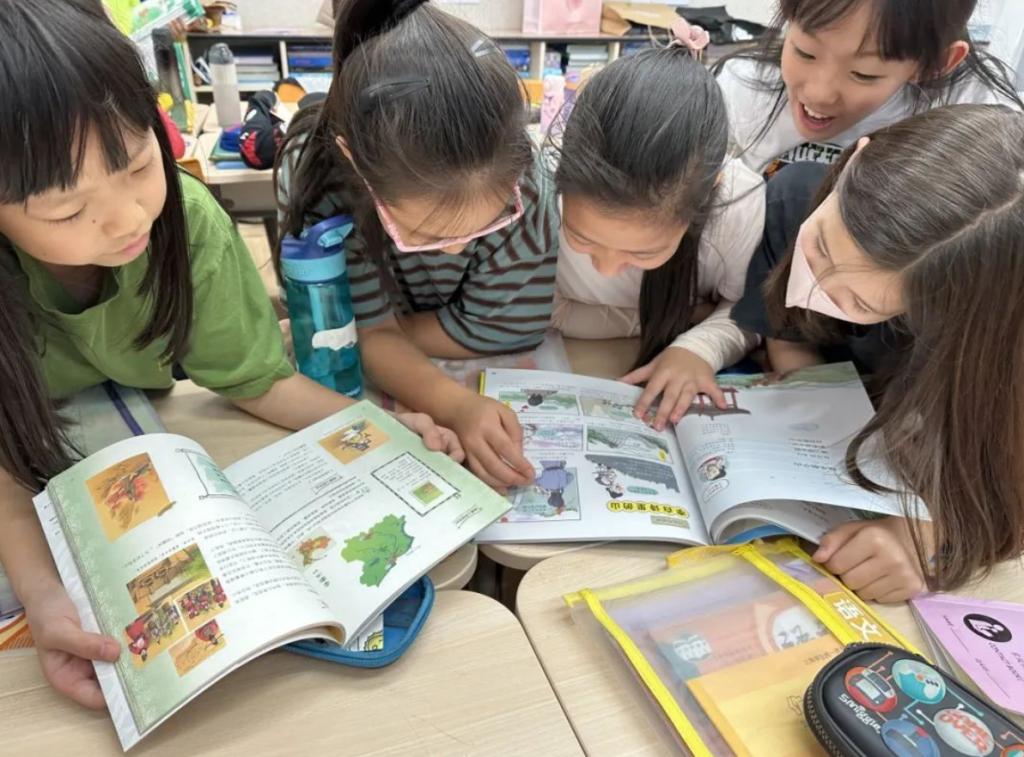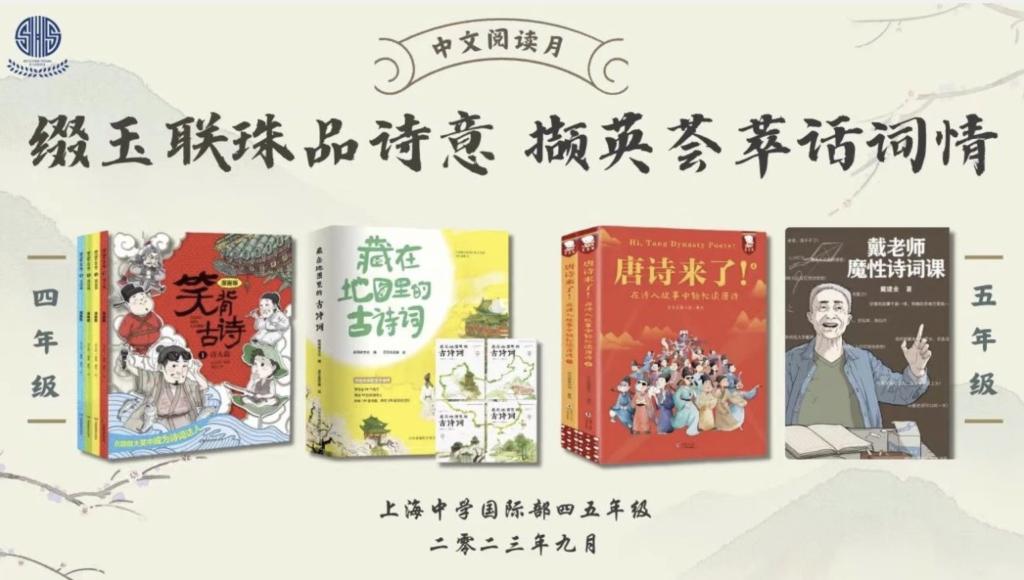-
ABOUT US
-
ACADEMICS
Curriculum Program
Departments
- English
- High School Chinese
- Primary and Junior School Chinese.
- High School Mathematics
- Middle School Mathematics
- Primary School Mathematics
- Music and Fine Arts
- Physical Education
- Physics
- Chemistry
- History and Geography
- Physical Science and Optional courses Department
- Middle School Biology
- High School Biology
- Social Sciences
- Computer Science
- Courses in Primary School
Achievements and Matriculations
College Counseling
Science & Technology Innovation Contest
-
ARTS
-
ATHLETICS
-
AT SHSID
SHSID ∣ TIMES
PTSA
Club Exhibition
- 龙吟社
- Live 2 Drama
- Choir
- Hip-pop Dance Club
- The Primary School Dance Troupe
- Symposiums Club
- Biology Workshop
- You Shan
- VEX Robotic
- Peking Opera Club
- Baseball Club
- Model United Nations
- The World Scholar’s Cup
- Future Problem Solving Club
- United States Academic Pentathlon
- OM Club
- AMC Club
- Music for Patients
- SHSID Gazette
- Smile Charity
- Cultural Moments
- SciAcademy
- Stem Doge Alliance
- Chinese Debate Club
- IAA
- Mock Trial Club
- Zhengming Club
- Art-to-zine
- Bananaheads
- Electronics
- Furry Friends
- GT-Racing
- MCG Philharmonics
- Village Radio
- IMMC Club
- Creative Design and Intelligent Fabrication
- Future City Research Project
- ECOCAP
- AdvocaSEA
- SPDC
- Medishine
- Floorball Club
- Animusic MTC
- Wings Up
Health and Wellness
Campus Safety
Cafeteria Service
-
ADMINISTRATION
-
ADMISSIONS
-
ALUMNI
Alumni Information
Honors Students
- Class of 2024
- Class of 2023
- Class of 2022
- Class of 2021
- Class of 2020
- Class of 2019
- Class of 2018
- Class of 2017
- Class of 2016
- Class of 2015
- Class of 2014
- Class of 2013
- Class of 2012
- Class of 2011
- Class of 2010
- Class of 2009
- Class of 2008
- Class of 2007
- Class of 2006
Who Studied at SHSID
SHS Foundation
-
DOCUMENTS
Puxi Campus Grade 4-5: Chinese Reading Month Enjoy the Beauty of Ancient Poetry
In the past month, the students of Grades 4-5 of SHSID Puxi Campus launched a Chinese Reading Month activity based on classical Chinese poetry. Through a multitude of mediums, they entered the souls of famous poets and experienced the timeless beauty of Chinese classics.
Grade 4
In the golden fall season, the fourth-grade bookworms embarked on a journey to explore the charm of ancient poems. For a month, they read "Laughing and Memorizing Ancient Poems" and "Ancient Poems Hidden in Maps." Through these readings, the students enjoyed classic poems, explored the emotional worlds of the poets, felt the lyrical beauty within the rhymes, and beheld the essence of Chinese culture. At home, they also read poetry books with their parents in the quiet corners, letting the notes of poetry beat gently in their hearts. In campus, students re-examined the grass and trees around them with a renewed poetic perspective, greatly expanding the outer edge of the Chinese language class.
Over the past three weeks, the students completed a poetry booklet titled "Poetry & Golden Autumn". During the first week, they speculated the names of the poems based on the details of the pictures, depicted the joys and sorrows with innovative thinking, and portrayed the poems through artistic mediums. In the second week, they interpreted the poems in depth, explored the rich meanings behind, and decorated their travel memories with ancient poems. Some students chose photos of their trip to the Summer Palace, where the blossoming peach blossoms were like a smoky haze, and the yellow-green willow branches reflected in the lake water. Some students couldn't help but write the corresponding poem when they saw the pool full of lotuses that they witnessed at the West Lake in the hot summer day. Other students put handsome photos of themselves in the Northwest China and wrote "The desert is lonely, and the sun sets over the Yangtze River." The students said that they had never thought that they had seen these scenes described in the poem during their travels. In the third week, they demonstrated their love and admiration for ancient poems by identifying the rhetorical devices and going back to their historical memories. Students also created mini files for their favorite poets.
This special journey through the scrolls, much like a beautiful poem, records the children's exploration and realization of ancient poems, and witnesses their growth and enhancement in the excellence of traditional Chinese culture.
Grade 5
Amid the five thousand years of Chinese civilization, the most colorful Chinese classical poetry is found in the Tang Dynasty. The students of Grade 5 took Tang poetry as the starting point, reading the books "Tang Poetry is Coming" and "Teacher Dai's Magic Poetry Class." Through the vivid and interesting language, the students saw all the life of the Tang Dynasty, experienced the joys and sorrows of the ancients, and felt the profound connotation of Tang poetry.
Every week, the students made a reading plan and completed the reading manual of "Poetry Anecdotes." The manual contained a series of interesting poetry topics, including filling in the poem colors, plant names, place names and recent antonyms. In addition, the manual also set up a number of knowledge about Tang poetry, the content of the creation of it’s background, the life of the author and the meaning of the poems. Through these questions, students further reviewed the reading content, and gained a more comprehensive understanding of Tang poetry and Tang Dynasty history.
In addition, the manual contained a multitude of context and opinion questions that cultivated the students' reading skills, critical thinking, and poetry appreciation abilities. They were tasked with answering questions such as "what line from "The Hard Way" can you use to cheer on your friend?" and "which poem can be used as propaganda for the poster of saving food in the canteen?" In using real-life, modern-day situations, ancient poetry was revitalized and given a contemporary spin. The students of H level also did a rigorous analysis on many famous poems that have been passed down through the ages.
The Tang Dynasty poetry history is rich, and Li Bai and Du Fu are undoubtedly the brightest "pearls" among them. Both of them are poets with great talent, ambition and feelings. If they were to travel to modern society, what jobs would they be suited for? The students offered their suggestions and wrote letters of recommendation for the two great poets. Some students recommend Li Bai to be the narrator of a scenic spot, because of his vivid depictions of famous mountains and rivers. Some students recommended Du Fu to be a journalist, believing that his news reports would be as brilliant as his poems. In addition, the students also took this opportunity to interview Li and Du, which helped exercise their flexible application of knowledge and innovative thinking.
In the spirit of poetry appreciation, the fifth grade students now have a new "classroom job" in Chinese class — "little poetry recommendation officer". Each student took turns in the Chinese class to introduce a favorite poem. From multiple perspectives, the students recommended poem one after another, not only broadening their knowledge, but also deepening our connection with classical Chinese poetry and culture.
At the end of Reading Month, Grade 4 and 5 held the preliminary Poetry Competition respectively. Two students from each class were selected, and they will form a new team across grades to participate in the final Poetry Competition in November. Who will be the champion of this tournament? Let's wait and see!
Reading famous classic poetry, eulogizing ancient historical chapters. This reading journey records SHSID students' exploration and perception of ancient poetry. In this ancient artistic atmosphere, the students enhanced their aesthetic taste and comprehension of poetry and felt the long history and splendid culture of the Chinese nation.


Written by Zhu Yiwei, Wu Yin
Pictures by G4-5 teachers
Edited by Serene Yang, Ginger Xu, Cong Luo, Wu Shiyu (Intern), Bianca Noguera